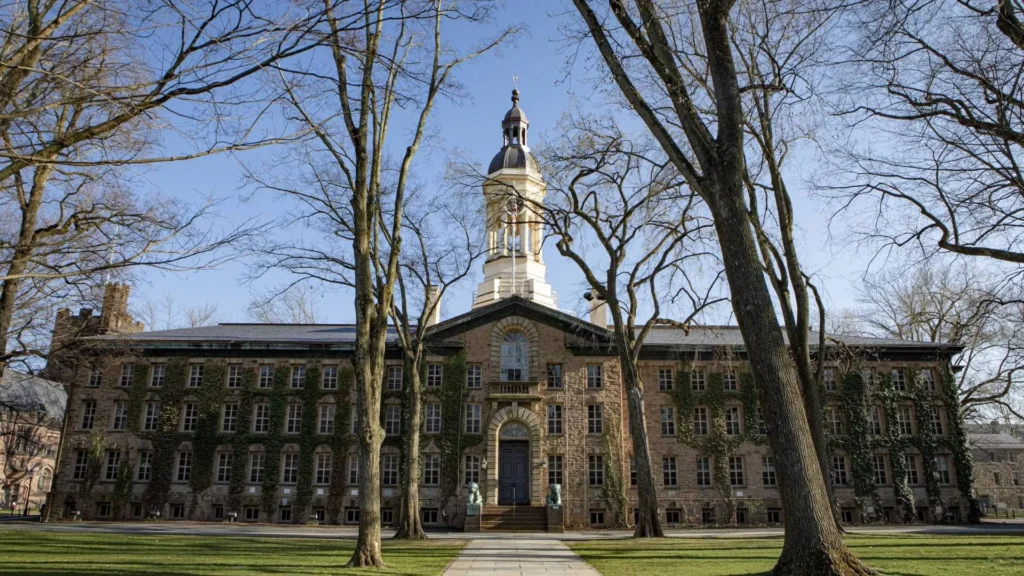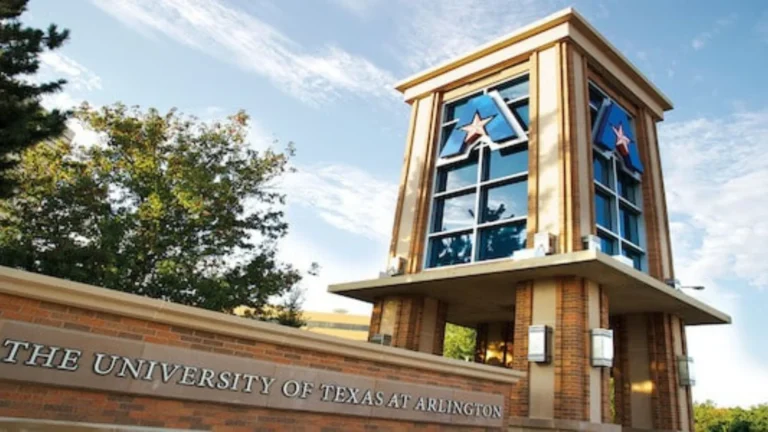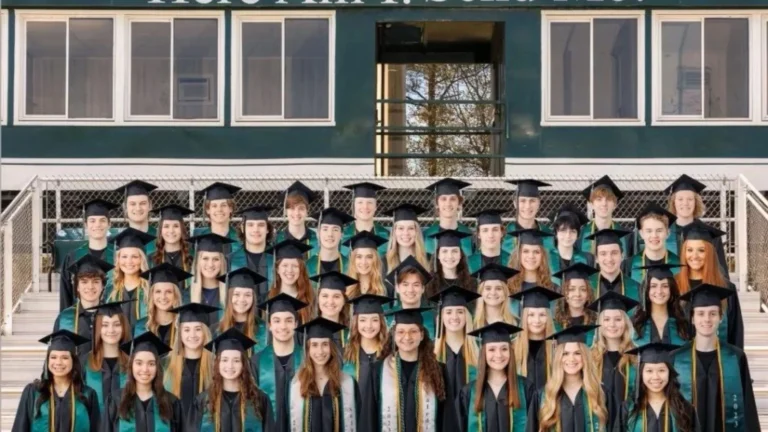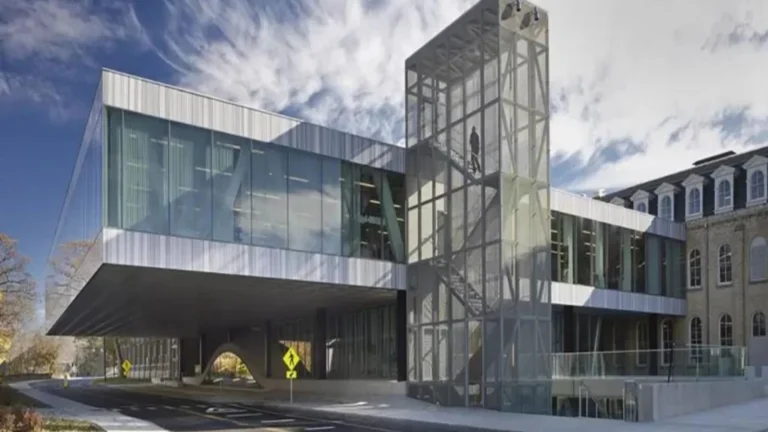Princeton University
Princeton University is one of the most prestigious and renowned educational institutions in the world. Located in Princeton, New Jersey, this Ivy League university has a rich history, a commitment to academic excellence,
and a vibrant campus life that attracts students from all over the globe.
Founded in 1746, Princeton University is the fourth-oldest institution of higher education in the United States. It has a long and illustrious history, having produced numerous notable alumni, including U.S. Presidents, Nobel Laureates, and influential leaders in various fields. The university’s campus is renowned for its beautiful architecture, lush greenery,
and the iconic Princeton University Chapel, which stands as a centerpiece of the university.
Academic Programs and Research
Princeton University is renowned for its rigorous academic programs and cutting-edge research. The university offers a wide range of undergraduate and graduate degrees across its six schools: the School of Arts and Sciences,
the School of Engineering and Applied Science,
the School of Architecture, the School of Public and International Affairs, the School of Nursing, and the Princeton Theological Seminary.
At the undergraduate level, Princeton’s liberal arts curriculum allows students to explore a diverse range of subjects before declaring a major.
The university’s core curriculum, known as the “general education” requirements,
ensures that students develop a broad base of knowledge and critical thinking skills.
Students can choose from over 50 undergraduate concentrations,
ranging from the traditional humanities and sciences to interdisciplinary programs such as African American Studies, Classics, and Neuroscience.
In addition to its strong undergraduate programs, Princeton University is also a leader in graduate-level education and research. The university’s graduate programs are consistently ranked among the best in the nation,
with a particular emphasis on the sciences, engineering, and public policy.
Princeton is home to numerous research centers and institutes, including the Princeton Plasma Physics Laboratory,
the Woodrow Wilson School of Public and International Affairs, and the Princeton Neuroscience Institute.
Campus Life and Student Experiences
Beyond the classroom, Princeton University offers a vibrant and diverse campus life. The university’s residential college system, which groups students into smaller communities, fosters a sense of belonging and community among undergraduates. Students have access to a wide range of extracurricular activities, including over 300 student organizations,
a thriving arts scene, and a highly competitive varsity athletics program.
One of the hallmarks of the Princeton experience is the university’s commitment to undergraduate research. Many students have the opportunity to collaborate with faculty on cutting-edge research projects,
often presenting their findings at conferences or publishing in academic journals. This hands-on learning experience provides students with valuable skills and insights that can shape their future careers and academic pursuits.
The university’s campus is also known for its stunning natural beauty,
with lush green spaces, winding paths, and the scenic Lake Carnegie.
The university’s location in Princeton, New Jersey,
allows students to enjoy the amenities of a charming college town while being within easy reach of the cultural and professional opportunities of nearby New York City and Philadelphia.
Admissions and Financial Aid
Princeton University is highly selective in its admissions process,
attracting some of the brightest and most talented students from around the world. The university receives tens of thousands of applications each year, with an acceptance rate that typically hovers around 5-6%.
To be considered for admission, applicants must submit a comprehensive application that includes standardized test scores,
letters of recommendation, and a personal statement. The university also places a strong emphasis on extracurricular activities, leadership experience, and demonstrated intellectual curiosity.
For students who are admitted to Princeton, the university is committed to making its education accessible through a robust financial aid program.
Princeton meets the full demonstrated financial need of all admitted students,
with over 60% of undergraduates receiving some form of financial assistance.
The university’s generous aid packages, which include grants, scholarships, and work-study opportunities,
have helped to make a Princeton education attainable for students from diverse socioeconomic backgrounds.

Conclusion
Princeton University’s enduring legacy as one of the
world’s premier institutions of higher education is a testament to its commitment to academic excellence,
innovative research, and the holistic development of its students.
From its storied history to its cutting-edge programs and vibrant campus life,
Princeton University continues to inspire and educate the next generation of leaders, thinkers, and change-makers.
As an Ivy League institution with a global reputation,
Princeton University attracts the brightest minds and provides them with the resources, support, and opportunities to thrive.
Whether through its rigorous academic curricula, its diverse extracurricular offerings, or its dedication to making its education accessible,
Princeton University remains a beacon of excellence and a shining example of the transformative power of higher education.
Nestled in the heart of New Jersey, Princeton University stands as a bastion of academic excellence, embodying the timeless values of knowledge,
discovery, and leadership.
As one of the oldest and most prestigious institutions of higher education in the United States, Princeton has a rich history that has shaped the trajectory of countless lives and the course of human progress.
Founded in 1746, Princeton University is the fourth-oldest college in the country, tracing its origins back to the colonial era. Over the course of nearly three centuries, the university has evolved into a global leader in education and research,
attracting the brightest minds from around the world and
producing an impressive roster of alumni who have made indelible marks in fields ranging from politics and the sciences to the arts and humanities.
Today, Princeton University is widely recognized as one of the “Ivy League” schools, a distinction that signifies its commitment to academic rigor,
innovative research, and the cultivation of well-rounded, intellectually curious individuals.
With its picturesque campus, world-class faculty, and diverse array of academic and extracurricular offerings, Princeton continues to captivate and inspire students, scholars, and visitors alike.
Academic Programs and Research Excellence
At the heart of Princeton University’s legacy lies its unwavering dedication to academic excellence and groundbreaking research. The institution’s six schools – the School of Arts and Sciences, the School of Engineering and Applied Science,
the School of Architecture, the School of Public and International Affairs, the School of Nursing, and the Princeton
Theological Seminary – collectively offer a vast array of undergraduate and graduate programs that cater to a wide range of academic interests and career aspirations.
Undergraduate Education
Princeton’s undergraduate curriculum is renowned for its depth and breadth, granting students the freedom to explore a diverse range of subjects before declaring a major.
The university’s “general education” requirements, known as the
“distribution requirements,” ensure that all undergraduates develop a solid foundation in the humanities,
natural sciences, and social sciences, fostering a well-rounded and interdisciplinary approach to learning.
In addition to the distribution requirements, Princeton’s undergraduate students can choose from over 50 distinct concentrations,
ranging from the traditional disciplines, such as history, economics, and physics, to more specialized and interdisciplinary programs, including African American Studies, Classics, and Neuroscience.
This flexibility allows students to tailor their academic journey to their unique interests and career aspirations,
while also encouraging them to engage with a breadth of knowledge and perspectives.
One of the hallmarks of the Princeton undergraduate experience is the emphasis on hands-on learning and research. Many students have the opportunity to collaborate with renowned faculty members on cutting-edge research projects,
often presenting their findings at conferences or publishing in academic journals.
This experiential learning component not only enhances students’ understanding of their chosen fields but also cultivates critical thinking,
problem-solving, and communication skills that are invaluable in both academic and professional settings.
Graduate Programs and Research Initiatives
In addition to its exceptional undergraduate programs, Princeton University is also renowned for its graduate-level education and research initiatives. The university’s graduate schools, which include the renowned Woodrow Wilson School of Public and International Affairs and the School of Engineering and Applied Science,
consistently rank among the best in the nation, attracting top-tier scholars and researchers from around the world.
Princeton’s graduate programs are characterized by a deep commitment to interdisciplinary collaboration and innovative problem-solving. Students have the opportunity to work alongside faculty members who are at the forefront of their respective fields, contributing to groundbreaking research that spans the natural sciences, social sciences, and humanities.
The university’s research initiatives are equally impressive, with a diverse array of centers, institutes,
and laboratories dedicated to addressing some of the most pressing challenges facing humanity.
For example, the Princeton Plasma Physics Laboratory is a world-leading center for fusion energy research,
while the Princeton Neuroscience Institute is at the forefront of understanding the human brain and developing new treatments for neurological disorders.
Through its robust graduate programs and cutting-edge research initiatives,
Princeton University continues to push the boundaries of human knowledge and make significant contributions to the global scientific and scholarly community.
Campus Life and the Princeton Experience
Beyond the classroom, Princeton University offers a vibrant and engaging campus life that complements its academic rigor and intellectual vitality. The university’s residential college system, which groups students into smaller,
close-knit communities, fosters a strong sense of belonging and community among undergraduates, while also providing a rich array of social,
cultural, and extracurricular opportunities.
Residential Life and Student Organizations
One of the defining features of the Princeton experience is the university’s residential college system, which was established in the 1980s.
Through this unique model, undergraduates are assigned to one of six residential colleges – Butler, Forbes, Mathey, Rockefeller,
Whitman, and Wilson – where they live, learn, and participate in a wide range of activities and events.
Each residential college has its own distinct character, traditions, and amenities, including dining halls, libraries, and recreational spaces. This residential system encourages students to establish deep connections with their peers, faculty, and staff,
while also promoting a sense of community and shared experience that extends beyond the classroom.
In addition to the residential college system, Princeton University boasts a vibrant and diverse array of student organizations and extracurricular activities.
With over 300 registered student groups,
ranging from academic clubs and service organizations to performing arts ensembles and recreational sports teams, there is something to pique the interest of every Princeton student.
The university’s thriving arts scene is another hallmark of campus life, with numerous performance venues, galleries, and creative spaces that showcase the talents of both student and professional artists.
From the annual Lawnparties celebration to the renowned Princeton University Orchestra,
the arts are deeply integrated into the fabric of the Princeton experience.
Athletics and Outdoor Recreation
Princeton University is also home to a highly competitive and successful varsity athletics program, with 37 NCAA Division I teams that compete in the Ivy League conference.
The university’s student-athletes have a long and storied tradition of excellence,
with countless conference championships, NCAA tournament appearances, and even Olympic gold medals to their name.
Beyond varsity sports, Princeton offers a robust intramural and club sports program, catering to a wide range of athletic interests and skill levels.
Students can also take advantage of the university’s state-of-the-art recreational facilities, including fitness centers,
swimming pools, and outdoor playing fields, to stay active and engaged in their physical well-being.
The natural beauty of Princeton’s campus is another significant draw for students, who can explore the university’s lush green spaces, scenic walking trails, and the picturesque Lake Carnegie.
These outdoor spaces provide ample opportunities for recreation, relaxation,
and personal reflection, complementing the intellectual and cultural vibrancy of the Princeton experience.
Admissions and Financial Aid
Princeton University’s reputation for academic excellence and innovation has made it one of the most sought-after institutions of higher education in the world.
Each year, the university receives tens of thousands of applications from prospective students, with an acceptance rate that typically hovers around 5-6%.
The university’s admissions process is highly selective, with a holistic evaluation that considers a range of factors, including academic performance,
standardized test scores, extracurricular involvement, leadership experience, and personal essays.
Princeton places a strong emphasis on identifying students who demonstrate intellectual curiosity, a passion for learning, and the potential to make meaningful contributions to the campus community and beyond.
Despite the challenging nature of the admissions process, Princeton University is committed to making its education accessible to students from diverse socioeconomic backgrounds.
The university’s financial aid program is renowned for its generosity,
with over 60% of undergraduates receiving some form of financial assistance.
Princeton meets the full demonstrated financial need of all admitted students,
offering a comprehensive package of grants, scholarships, and work-study opportunities.
This commitment to accessibility has been a cornerstone of Princeton’s mission for decades, with the university’s founding president, John Witherspoon, declaring that “the doors of this institution should be open to youth of all descriptions,
whether rich or poor.”
This principle of inclusivity continues to guide Princeton’s approach to financial aid,
ensuring that the university’s transformative educational experience is within reach for students from diverse backgrounds.
The Legacy of Princeton University
Princeton University’s enduring legacy as a preeminent institution of higher education is a testament to its unwavering commitment to academic excellence, innovative research, and the holistic development of its students.
From its storied history as one of the oldest colleges in the United States to its position as a global leader in education and discovery,
Princeton has consistently pushed the boundaries of human knowledge and inspired generations of scholars, leaders, and change-makers.
The university’s illustrious alumni roster is a testament to the transformative power of a Princeton education. Among its distinguished graduates are U.S. Presidents, Nobel Laureates, Pulitzer Prize winners, and influential figures in fields ranging from politics
and business to the arts and sciences. This impressive legacy speaks to the university’s ability to cultivate the next generation of visionary thinkers, problem-solvers, and trailblazers.
At the heart of Princeton’s success lies its steadfast dedication to fostering a vibrant,
diverse, and inclusive community that values intellectual curiosity, collaboration








I don’t think the title of your article matches the content lol. Just kidding, mainly because I had some doubts after reading the article.